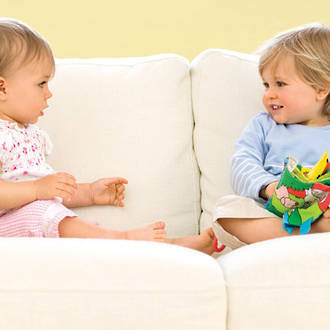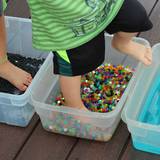7 Tips on learning to share
|
Learning to share is all part of growing up, although it doesn't always come naturally with young children. Follow these tips on helping your toddler and pre-schooler learn to share and to develop friendships along the way.
|
You might also be interested in ...
Using feet for sensory play activities
Sensory experience is an important part of child development, but often kids are so busy getting their hands messy, that we forget about them using their feet for sensory play activities. Using their feet for sensory or messy play has many benefits, especially when it comes to exploring the sense of touch.
Questions to ask preschoolers about their artwork
Young children love to paint and draw, build and sculpt and when they present us with their artworks it’s easy to tell them that they’ve done a great job - whatever the results! However with a few open-ended questions you can find out a little more about what they’ve produced and what inspired them. You’ll also help develop their creative and critical thinking skills in the process.







Follow these tips on helping your toddler and pre-schooler learn to share and to develop friendships along the way.
7 Tips on learning to share
1. Set an example
2. House rules
3. Favourite toys
4. Take toys with you
5. Sharing activities
6. Offer alternatives
7. Praise praise praise
Tell your friends
Like the article you've just been reading? Click on the Refer A Friend link at the top of the page and send the details to friends who might like to read it too.More Hot Topics for you to enjoy
- The plus side of play dates
- The arrival of a sibling
- Working together and managing behaviour
Image source: todaysparent.com